 One year ago: Bavarians are going to the polls on the opening day of Oktoberfest. Some perennial events always take place in pairs.
One year ago: Bavarians are going to the polls on the opening day of Oktoberfest. Some perennial events always take place in pairs.
Two years ago: H and I share a round-up of Frankonian churches. Conservative estimates place the property value of the land that the Church owns in Germany at around two hundred thirty billion euro.
 Three years ago: Germany is undergoing a brain-drain, with recruiting and keeping talented individuals. Immigration policy reforms are geared towards attracting professionals but there are many challenges in the practical execution of these plans.
Three years ago: Germany is undergoing a brain-drain, with recruiting and keeping talented individuals. Immigration policy reforms are geared towards attracting professionals but there are many challenges in the practical execution of these plans.
Sunday 14 September 2014
this day in pfrc history
Four years ago: a reporter embarks on
an odyssey to the autonomous Mount Athos to gain some insight in the
culture that helped contribute to the Greek financial crisis.
catagories: 🇩🇪, 🇬🇷, ✝️, 📔, holidays and observances, labour, networking and blogging
Thursday 11 September 2014
it happened on the way to the forum: diomedes or totem and taboo
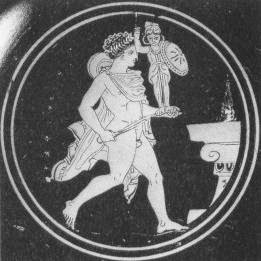 The modern-day Brindisi in in Apulia on the heel of Italy, facing the Adriatic, is mentioned quite often—like when the Senate, fleeing from Julius Caesar after he crossed the Rubicon, abandoned the capital for Greece and generally as a destination for jaunting off in order to embark for the eastern lands. I discovered, however, this city at the terminus of the Via Appia, has a very rich history and mythic endowment as well. As the Matter of Rome itself has foundations in Trojan refugees, Brundisium too was established by a hero of the Iliad—one Diomedes, an Achaean warrior counted in the pantheon of the best along with Odysseus and Ajax for his strategic and physical skills, and the only mortal with the distinction to having fought alongside the goddess Athena and wounding an immortal, Ares. After this battle, Diomedes is bound to the Goddess of Wisdom for all eternity, but the divine the connection to southern Italy and greater Rome, one has to go back further to Athena’s birth and upbringing. Having emerged fully formed from the forehead of Zeus, Athena, though radiant and wise, did sort of miss out on social development, and in order to imbue her with some graces, she was raised by human foster parents alongside their own daughter, Pallas. One day Athena and Pallas were playing a bit rough, and not realising her own strength—or her foster-sister’s fraility, and the goddess accidentally killed the mortal girl. Athena was devastated and took the name Pallas Athena evermore and fashioned a wooden statue of her, the Palladium, which later fell from the sky and was taken as the omen to found the City of Troy. The icon was said to protect the city and it was revered as a symbol of state and Troy could not be taken so long as it remained within the city walls. Diomedes (who got several warnings from Athena about being too rough and about not killing or maiming any of the central characters) and Odysseus snuck into the city and wrested the Palladium away from Debbie-Downer Cassandra (Ajax was instrumental in seizing the statue but was punished with a divine madness later for having violated the altar where it was displayed), who was the only other person who knew that the relic ensured the safety of Troy but no one listened to her.
The modern-day Brindisi in in Apulia on the heel of Italy, facing the Adriatic, is mentioned quite often—like when the Senate, fleeing from Julius Caesar after he crossed the Rubicon, abandoned the capital for Greece and generally as a destination for jaunting off in order to embark for the eastern lands. I discovered, however, this city at the terminus of the Via Appia, has a very rich history and mythic endowment as well. As the Matter of Rome itself has foundations in Trojan refugees, Brundisium too was established by a hero of the Iliad—one Diomedes, an Achaean warrior counted in the pantheon of the best along with Odysseus and Ajax for his strategic and physical skills, and the only mortal with the distinction to having fought alongside the goddess Athena and wounding an immortal, Ares. After this battle, Diomedes is bound to the Goddess of Wisdom for all eternity, but the divine the connection to southern Italy and greater Rome, one has to go back further to Athena’s birth and upbringing. Having emerged fully formed from the forehead of Zeus, Athena, though radiant and wise, did sort of miss out on social development, and in order to imbue her with some graces, she was raised by human foster parents alongside their own daughter, Pallas. One day Athena and Pallas were playing a bit rough, and not realising her own strength—or her foster-sister’s fraility, and the goddess accidentally killed the mortal girl. Athena was devastated and took the name Pallas Athena evermore and fashioned a wooden statue of her, the Palladium, which later fell from the sky and was taken as the omen to found the City of Troy. The icon was said to protect the city and it was revered as a symbol of state and Troy could not be taken so long as it remained within the city walls. Diomedes (who got several warnings from Athena about being too rough and about not killing or maiming any of the central characters) and Odysseus snuck into the city and wrested the Palladium away from Debbie-Downer Cassandra (Ajax was instrumental in seizing the statue but was punished with a divine madness later for having violated the altar where it was displayed), who was the only other person who knew that the relic ensured the safety of Troy but no one listened to her.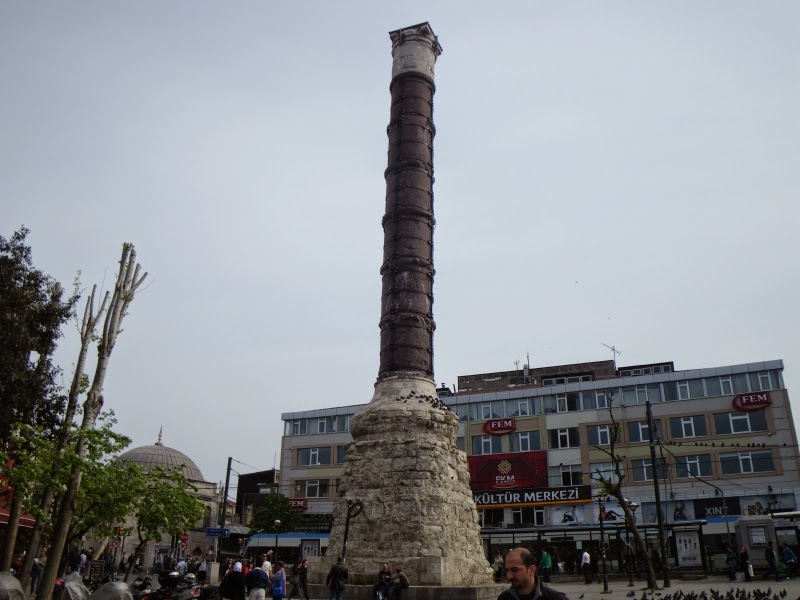 After the war and the Greeks dispersed, Diomedes migrated to the Italian coast, having been unseated as king of Argos during his decade absense, and as the talisman, a monkey's paw, was bringing him no great fortune (probably due to the unsavoury though preordained manner in which it was purloined), Diomedes surrendered it to his enemy, Aeneas, as the keystone of his new settlement, Rome. This treasure appears in official manifests for well of seven-hundred years of documented history, but it was perhaps lost to the ages with the sack of Rome by the Visigoth hordes in 410 AD. Some believe, however, during the waning years of the Western Empire that Constantine, an avid collector, smuggled the Palladium to Constantinople, as a blessing for the Eastern capital and it is buried under his column, still standing in modern-day İstanbul.
After the war and the Greeks dispersed, Diomedes migrated to the Italian coast, having been unseated as king of Argos during his decade absense, and as the talisman, a monkey's paw, was bringing him no great fortune (probably due to the unsavoury though preordained manner in which it was purloined), Diomedes surrendered it to his enemy, Aeneas, as the keystone of his new settlement, Rome. This treasure appears in official manifests for well of seven-hundred years of documented history, but it was perhaps lost to the ages with the sack of Rome by the Visigoth hordes in 410 AD. Some believe, however, during the waning years of the Western Empire that Constantine, an avid collector, smuggled the Palladium to Constantinople, as a blessing for the Eastern capital and it is buried under his column, still standing in modern-day İstanbul.
Wednesday 10 September 2014
kriegsbilder oder epimetheus
Once events begin to slip from living memory, I think either myths are made or tenants too difficult to reconcile are transformed into something spontaneously decisive and regarded with some kind of groundless anti-legend. Tragically, I believe that World War I is starting to be understood as the latter—while knowing that this is a heading that can be reversed.
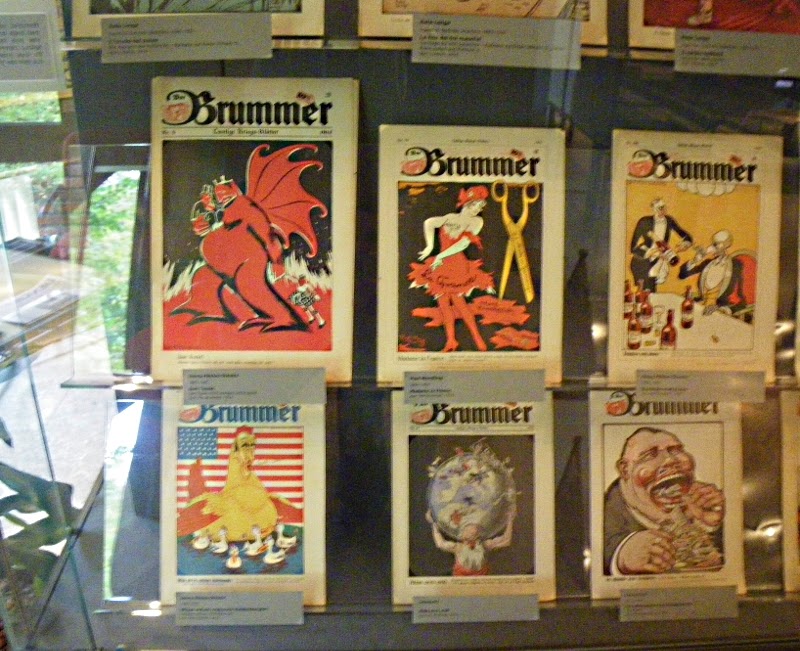 The State Ar- chives is hosting a small exhibit of the ephemeral—periodicals, political cartoons, caricatures and patriotic posters gathered from all corners of Europe, highlighting the works of graphic artists Max Beckmann, Ernst Barlach, Käthe Kollwitz and Max Liebermann from 1914 to 1918—which are important moments, the scattered sibylline leaves of yesterday's unwanted newspapers, to reflect on.
The State Ar- chives is hosting a small exhibit of the ephemeral—periodicals, political cartoons, caricatures and patriotic posters gathered from all corners of Europe, highlighting the works of graphic artists Max Beckmann, Ernst Barlach, Käthe Kollwitz and Max Liebermann from 1914 to 1918—which are important moments, the scattered sibylline leaves of yesterday's unwanted newspapers, to reflect on.
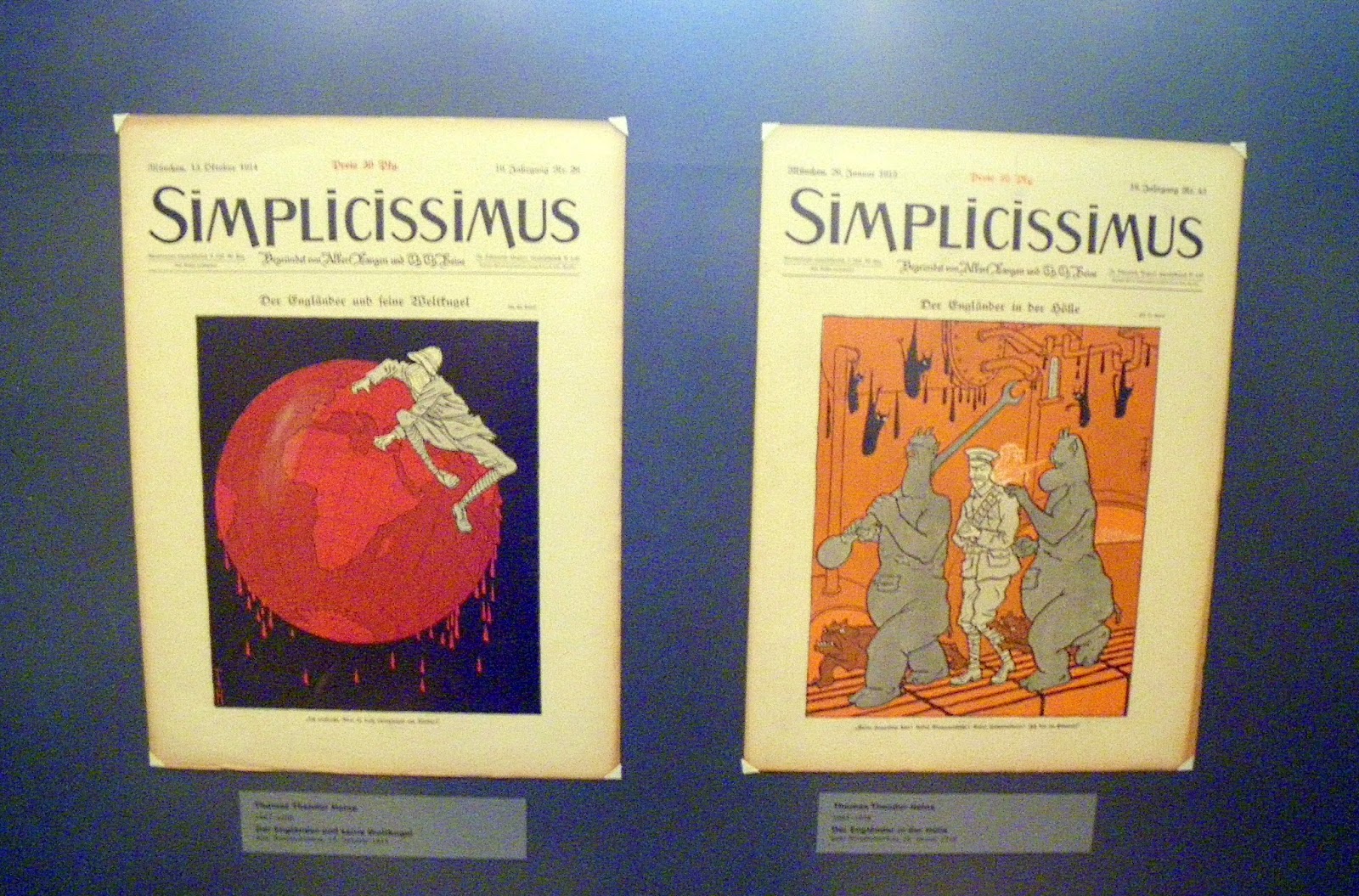 History, with is its causes and effects removed from witness though we all live with the aftermath, can seem a bit academic and arbitrary, but seeing that the same surety and detracting prescience was in circulation back then too makes the past breathily close and a-pace with usual tumult of commentary and the media echo-chamber.
History, with is its causes and effects removed from witness though we all live with the aftermath, can seem a bit academic and arbitrary, but seeing that the same surety and detracting prescience was in circulation back then too makes the past breathily close and a-pace with usual tumult of commentary and the media echo-chamber.
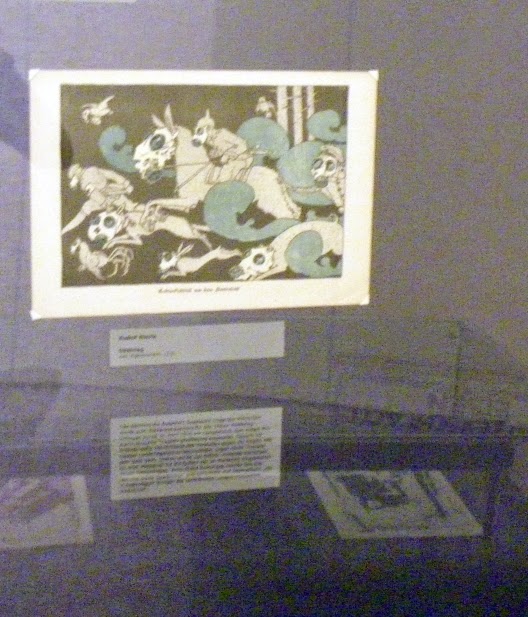 The proximity of that target of acquaintanceship and familiarity can always be set just a little further back.
The proximity of that target of acquaintanceship and familiarity can always be set just a little further back.
 History, with is its causes and effects removed from witness though we all live with the aftermath, can seem a bit academic and arbitrary, but seeing that the same surety and detracting prescience was in circulation back then too makes the past breathily close and a-pace with usual tumult of commentary and the media echo-chamber.
History, with is its causes and effects removed from witness though we all live with the aftermath, can seem a bit academic and arbitrary, but seeing that the same surety and detracting prescience was in circulation back then too makes the past breathily close and a-pace with usual tumult of commentary and the media echo-chamber. The proximity of that target of acquaintanceship and familiarity can always be set just a little further back.
The proximity of that target of acquaintanceship and familiarity can always be set just a little further back.Tuesday 9 September 2014
ecumene
Vox features a collection of several maps to illustrate the rise and fall of the Roman Empire, on the anniversary of the death of Caesar Augustus, our Octavian. It seemed like a fitting and timely supplement to plot the development of conquest and eventual decline, including facets of its equally important legacies that shape the ways of the world today. Ecumene is a geographical term adopted from the Greek οἰκουμένη referring to the known universe, and the origin of the word ecumenical.











